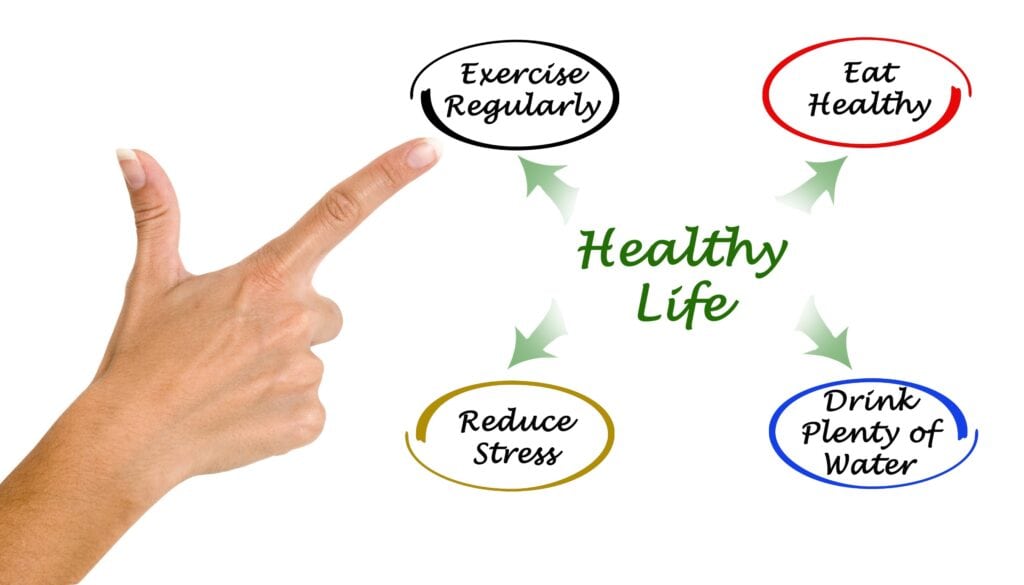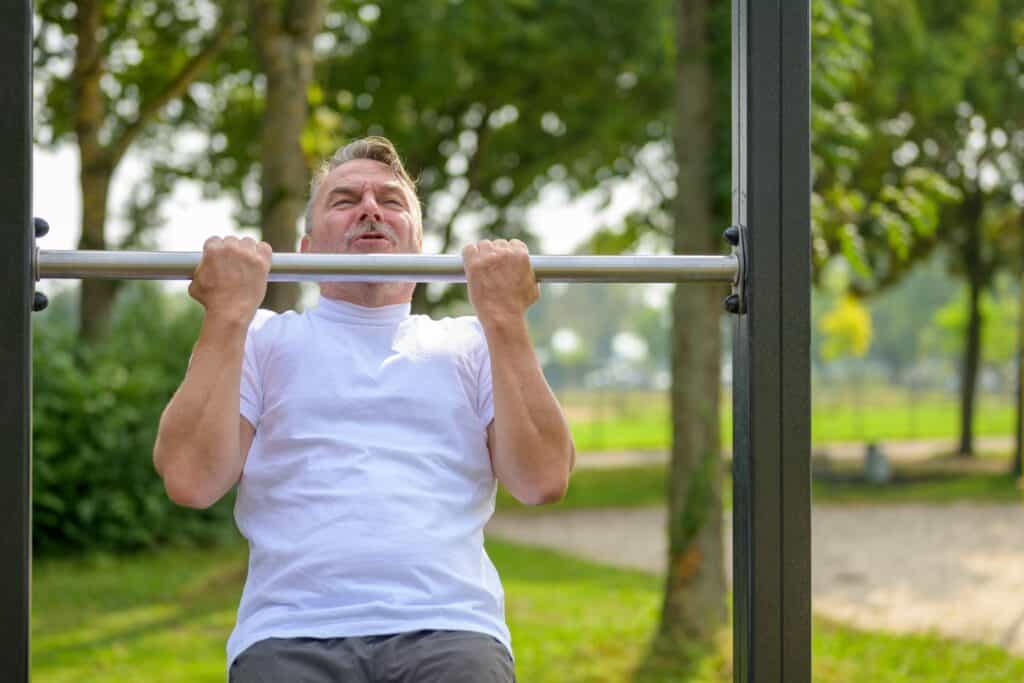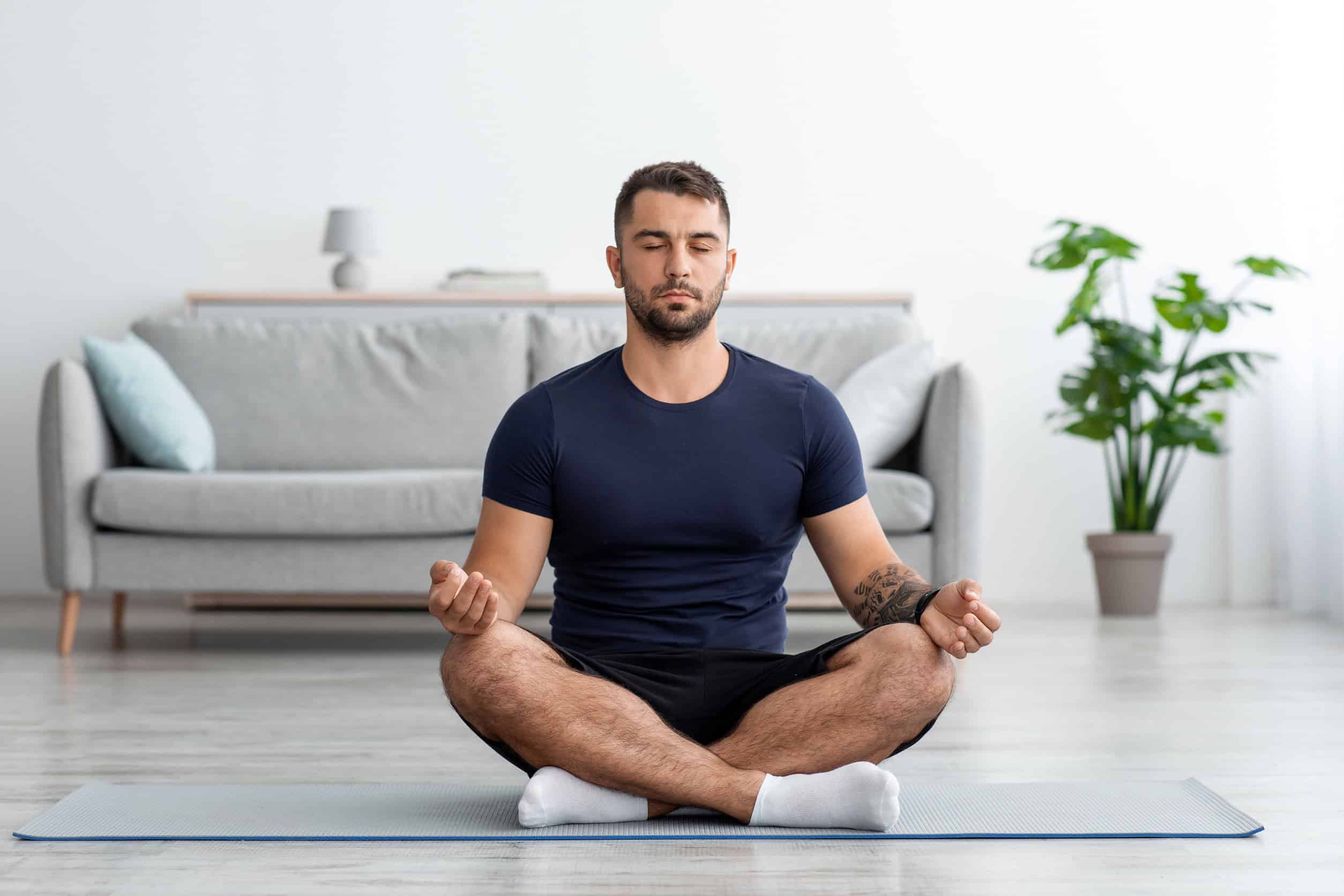Many men silently struggle with their mental health. Battling feelings of stress, anxiety, and depression while feeling the pressure to maintain a strong front.
This persistent struggle can lead to feelings of isolation and overwhelm, making it difficult to enjoy life and connect with others.
If you have experienced these types of feelings …
I understand what you’re going through, as I’ve been there too!
The good news is that there is a powerful, yet often overlooked solution that can help you reclaim your mental well-being …
EXERCISE!
In this blog post, we’ll explore how incorporating physical activity into your routine can be a game-changer for your mental health, providing not only relief …
But also a renewed sense of purpose and vitality.
The fact that you’re reading this post means you’re ready to transform your mental health.
So, let’s get started!
Understanding the Connection between Physical Activity and Mental Health
Physical activity isn’t just about building muscles or shredding weight. It actually plays a vital role in mental health …
Acting as a natural antidepressant and anxiety reliever.
What is Physical Activity?

Physical activity includes any bodily movement that requires energy. It includes a wide range of activities, from:
- Leisurely walks
- Vigorous runs
- Swimming
- Dancing in your living room
And more.
The beauty of physical activity lies in its versatility, allowing you to choose activities that suit your preferences and lifestyle.
Including physical activity into your daily routine doesn’t mean you need a gym membership or fancy equipment (although working out at a gym is something that I positively encourage) …
Everyday tasks like household chores, gardening, or playing with your kids are excellent ways to get moving.
The key is to stay active, no matter how small the activity may seem.
The Benefits of Physical Activity for Mental Health
“There is an increasing amount of evidence documenting the beneficial impacts of physical activity on mental health.”
“There is an increasing amount of evidence documenting the beneficial impacts of physical activity on mental health.”
Studies show that regular physical activity has many health benefits. It releases endorphins …
often referred to as “feel-good” hormones, which can uplift your mood and reduce feelings of depression and anxiety.
Engaging in low intensity aerobic exercise, such as walking for 30 minutes, 3 to 5 days a week …
can significantly enhance positive moods and improve mental health.
These natural chemicals create a sense of happiness and relaxation, making regular workouts an effective mood booster.
Aside from improving mood, physical activity can enhance sleep quality …
A crucial factor in maintaining good mental health.
A good night’s sleep can reduce stress levels, enhance concentration, and promote emotional stability …
All contributing to a healthier mind.
Exercise also plays a role in improving self-esteem and body image.
When you take part in regular physical activity, you tend to feel more confident and positive about yourself.
This can be particularly beneficial for those dealing with mental health issues, as it helps alleviate symptoms of conditions like anxiety and depression.
It also leads to more productivity at work, and in life in general …
Giving you a more positive outlook on challenges that come your way.
What happens to your mental health when you don’t exercise?

Neglecting physical activity can have detrimental effects on mental health, particularly for men …
And can contribute to various mental health problems.
A sedentary lifestyle is often linked to increased feelings of stress, anxiety, and depression. Without the release of endorphins that comes from exercise, mood regulation becomes more challenging. This leads to heightened emotional fluctuations and irritability.
Additionally, the lack of physical activity may contribute to poor sleep quality, exacerbating issues such as fatigue …
And difficulty concentrating.
Men may also experience a decline in self-esteem and confidence when they become less active, which can create a vicious cycle of discouragement and withdrawal from social interactions.
This can create a vicious cycle of discouragement and withdrawal from social interactions.
Ultimately, the absence of exercise can diminish resilience in facing those daily challenges.
Making it vital to prioritise physical activity for overall mental well-being.
How does exercise reduce stress?

Exercise is a powerful tool for managing stress and mental illness, particularly in men, through its role in regulating cortisol levels.
Cortisol, often referred to as the “stress hormone,” is released in response to stress …
And plays a significant role in the body’s fight-or-flight response.
Engaging in regular physical activity can help lower cortisol levels and thereby promote a sense of calm and well-being.
This reduction in cortisol not only alleviates feelings of anxiety but also enhances the body’s ability to cope with stressors more effectively.
So by creating a healthier balance of hormones, exercise contributes to improved mood and emotional stability …
Encouraging you to tackle daily challenges with greater resilience and a clearer mindset.
Getting Started with Physical Activity
Starting a new exercise routine can feel daunting, especially if you’re new to physical activity.
However, by setting realistic goals and taking gradual steps …
You can successfully merge exercise into your life and enjoy its mental health benefits.
How Much Physical Activity Should I Do?
Experts recommend aiming for at least 30 minutes of moderate-intensity exercise, such as brisk walking or cycling, three to five times a week to improve both mental and physical health.
One of the best forms of exercise you can do is resistance training. Not only will you benefit from it mentally, but you will …
- Be physically stronger
- Have a good physique
- Gain confidence and pride from the challenge of lifting weights
The key is consistency!
The more regularly you exercise, the more significant the mental health benefits.
Including physical activity into your daily life can be as simple as choosing to take the stairs instead of the elevator or walking to work instead of driving.
Small changes in your daily routine will add up to substantial health benefits over time.
When starting, it’s important to pace yourself.
Slowly increase the intensity and duration of your workouts. This approach helps prevent burnout and injury, ensuring that exercise becomes a sustainable part of your lifestyle.
Overcoming Barriers to Physical Activity
Despite its benefits, many individuals face barriers to regular physical activity, due to:
- Lack of time
- No motivation
- Not confident of working out in front of others
Identifying these barriers is the first and hardest step to overcoming them and making exercise a consistent part of your routine.
Lack of time
The most important thing that you possess is your mind and body.
And yet …
So many men fail to take care and maintain these two things and instead, take more care of other items like their car …
or spend more time at work than taking one hour a day to something that actually keeps them alive.
Just let that sink in ..!
So, scheduling physical activity within your day, whether it’s starting your day with a morning walk or during your lunch break …
And simply having a set time for exercise makes it easier to stick to.
No motivation

Not having the motivation to exercise can affect a lot of people, especially after they might have gotten out of the habit of exercising.
The routine that might have kept you on track to consistently do your workout before, is now reliant on your motivation levels and how you feel.
This is why motivation should not be used to dictate whether you exercise or not.
There have been plenty of days when I have been unmotivated to train, but I did it anyway.
While motivation is great and can help you to perform better, in whatever you’re doing …
Using motivation as an excuse for doing something or not is a bad idea.
So don’t rely on motivation but use it to your advantage when you feel motivated.
Not confident of working out in front of others
I get it, some people feel exposed and suddenly feel self-aware when they start exercising in front of others …
Especially if you are out of shape.
This feeling may prevent you from going to the gym, joining an exercise class or some other joining a group of people who exercise regularly.
This feeling can be overcome in time, but it’s important to recognise that it does take time.
And therefore you need to take a leap of faith and push through the negative barrier to get to that point …
Where you no longer feel worried about exercising in public.
This might mean that for 3 months, you exercise at home.
Maybe you do that for the rest of your life, at least you’re active.
But I am sure that after a certain amount of time, you will get to a point where you feel good about exercising with or around other people.
Choosing the Right Physical Activity Approach
It’s important to find the right exercise approach so that you reap the mental health benefits of physical activity.
It may involve experimenting with different types of activities and doing what works within your lifestyle.

Finding an Enjoyable Physical Activity
I am sure you’ve heard the phrase “exercise should be enjoyable.”
So here are my thoughts on that …
NO IT DOESN’T!
Please let me clarify what I mean.
Of course, for people who are not currently exercising, then the first step is probably to find an exercise that they enjoy.
This would be a great start on the road to being physically active.
However, not all exercise is fun …
and yet many of us still do it.
Why?
Because we see exercise as something we have to do to maintain our health and fitness.
We know that taking care of our body and our mind is vital to function better in other areas of our lives.

As an example, I train at the gym three to four times a week. On many occasions I have to go before work, which is a killer!
Do I always enjoy going to the gym …
Not always.
There are plenty of times when I would like to be at home or somewhere else.
But I know that I need to do it.
And believe me, when I’ve finished …
I’m so grateful that I did it.
Think about this, there are many people out there who are unable to run, walk or do the things we take for granted.
And so you should not take running, walking, or being able to lift weights for granted anymore …
And appreciate what you can do by doing it.
So by all means, you should start by finding something you enjoy …
But as you progress and aim to increase your fitness level, there will come a point where it is a challenge …
And maybe that challenge is not enjoyable …
But you will feel good for taking on the challenge.
Best Exercises for Mental Health Benefits

Any form of moderate to intense exercise can improve your mental health. These exercises can include:
- Walking
- Running
- Resistance training
- Dancing
- Swimming
- Team sporting activities
As well as others.
Aerobic exercises, such as running or cycling, are excellent for improving mood and reducing symptoms of depression and anxiety.
Resistance training, like weightlifting, can enhance self-esteem and body image, contributing to a positive mental state. By building physical strength …
You’re also building mental resilience, which can positively impact your overall well-being.
Low-intensity aerobic exercises, such as yoga or walking, are beneficial for reducing stress hormones and promoting mental relaxation.
These activities offer a gentle yet effective approach to enhancing mental health.
Making Physical Activity a Sustainable Habit
To make sure you consistently stay active, it is important to schedule your activities in your week and stick to them.
Once you decide, for example …
To go to the gym on a Monday morning, you are committed to go to the gym …
In the same way as not being able to skip going into work.
Consider sharing your fitness goals with others or hire a personal trainer. This provides support, encouragement while also creating accountability.
It also makes it easier to stay committed to your exercise routine as your ego will make it difficult for you to fail in front of others.
Maintaining a Healthy Lifestyle

To maintain a healthy lifestyle, you need to make small changes overtime …
And those changes will become massive changes after one or two years.
They won’t seem drastic and therefore you will be able to maintain them for most of your life as they become habits that you don’t even think about …
You just do!
Nutrition will have a part to play within improving your mental health, alongside regular exercise.
Proper nutrition provides the necessary fuel for your body and mind, enhancing your ability to cope with stress and maintain emotional stability.
Recap: Cultivating a Lifelong Commitment to Health and Wellbeing
Physical exercise offers a wealth of benefits for mental health, making it an invaluable tool for wellness seekers, fitness enthusiasts, and mental health advocates alike.
By understanding the connection between exercise and mental well-being, you can use the power of physical activity to improve your mood …
Reduce stress, and enhance your quality of life.
Whether you’re taking your first steps towards regular exercise or seeking to progress your fitness to the next level …
Remember that every small effort counts.
Make physical activity a sustainable habit, and watch as it transforms your mental health and overall well-being.


